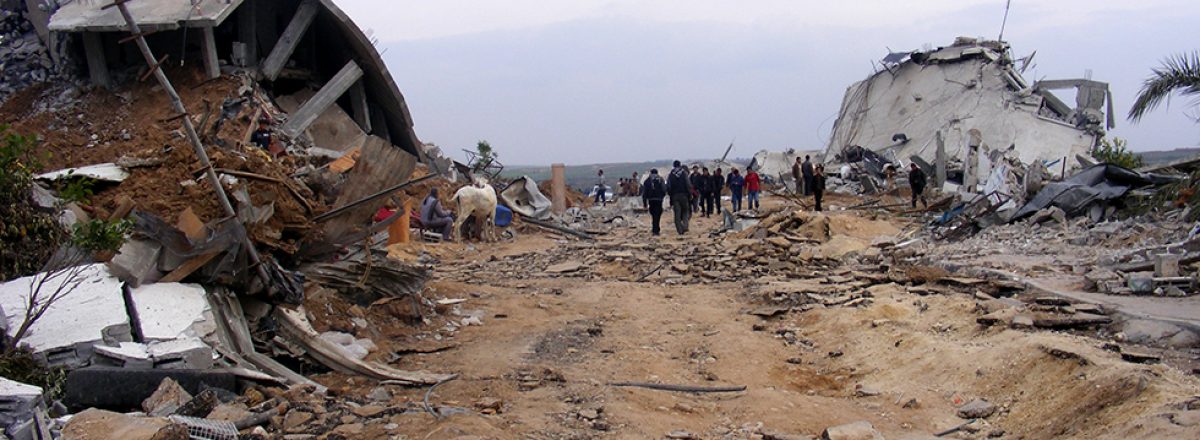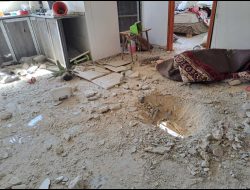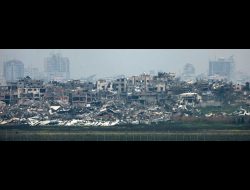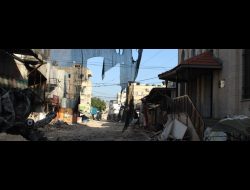Over the years, Israel has demolished hundreds of homes and destroyed thousands of dunams [1 dunam = 1,000 sq. meters] of farmland and cultivated groves, claiming it was necessary “for military purposes." Implementation of this policy has deprived thousands of Palestinians of their homes and livelihood. This policy was used primarily in the Gaza Strip during the second intifada, in the period before Israel executed its Disengagement Plan and evacuated Israeli settlements from Gaza. The officially stated purpose of the policy was to create so-called “security zones” around Israeli settlements and military posts, particularly near the border between Gaza and Egypt.
Over the years, Israel has demolished hundreds of homes and destroyed thousands of dunams of farmland and cultivated groves, citing “military purposes.” Implementation of this policy, which constitutes collective punishment, has deprived thousands of Palestinians of their homes and livelihood.
Homes were usually demolished at night without residents being given any advance warning. In areas where there were frequent gun battles between Palestinians and Israeli forces – e.g., the Philadelphi Route along the border between Gaza and Egypt – some people preemptively left their homes and moved to safer areas. However, in most cases, some members of the family stayed behind to safeguard their homes and property. These latter had no choice but flee once they were awakened by the rumble of tanks and bulldozers at their door. Their homes and possessions were reduced to rubble.
Israel resumed largescale home demolitions in the Gaza Strip during two subsequent rounds of fighting in the Gaza Strip. During Operation Cast Lead (January 2009) and Operation Protective Edge (summer of 2014) Israel levelled entire neighborhoods and also devastated thousands of other homes across the Gaza Strip. Israeli officials cited “military necessity” as grounds for the destruction, arguing it was vital to the safety of Israeli security forces and settlers. The officials said that tunnels for smuggling arms had been dug under these homes, or that Palestinians had fired at Israeli targets from these houses or fields. The Israeli military claimed the effectiveness of the policy had been proven, yet offered no evidence to support its contention.
Regardless, the effectiveness of the policy has no bearing on its legality. Israel is a signatory to international humanitarian law conventions and is dutybound to uphold them. It cannot choose to disregard provisions that supposedly keep it from achieving its goals. International law prohibits the destruction of private property, other than exceptional cases of imperative military necessity that cannot be met in any other way. In its commentary on this prohibition, the ICRC noted that “It is […] to be feared that bad faith in the application of the reservation may render the proposed safeguard valueless; for unscrupulous recourse to the clause concerning military necessity would allow the Occupying Power to circumvent the prohibition set forth in the Convention”. This concern has materialized in the case of Israel. in complete disregard for the spirit and object of humanitarian law as well as of the fact that the exception was devised for use solely in extremities, Israel has based its policy on this narrow exception.
The homes and orchards destroyed by security forces belonged to Palestinians who were not suspected of any involvement in causing harm to Israeli civilians or security forces. All the same, the military destroyed these people’s homes or livelihoods. They were given no opportunity to plead their case before any instance and received no compensation for the damage they sustained. This policy of collective punishment inflicted lasting harm on thousands of people.



